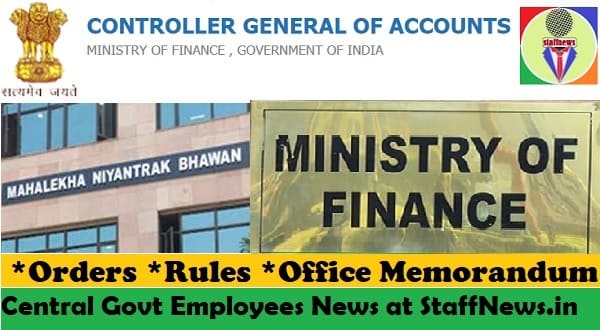Handling of deductions like TDS, Income Tax, GST, Employee’s Contribution etc. under SNA SPARSH: CGA O.M. dated 28.07.2025
OM No. I-126/6/2024-ITD-CGA/64
Government of India
Ministry of Finance
Department of Expenditure
Office of Controller General of Accounts
Mahalekha Niyantrak Bhawan
New Delhi
Date: 28.07.2025
OFFICE MEMORANDUM
Sub: Handling of deductions like TDS, Income Tax, GST, Employee’s Contribution etc. under SNA SPARSH.
References have been received from various State Governments/UTs regarding the mechanism to be adopted for handling deductions such as TDS, GST, employee contributions, and other statutory or non-statutory deductions under the SNA SPARSH framework. In this regard, it is clarified that, as per the SNA SPARSH protocol, the Public Financial Management System (PFMS) does not capture individual deduction components in the payment file. Instead, PFMS only processes the Gross and Net amounts. The Central Share is released based on the Gross value of the payment file, in accordance with the scheme-specific sharing ratio configured by the respective State Scheme Manager and duly approved by the Program Division, as per the applicable scheme guidelines.
2. As per the SPARSH protocols all the deductions have to be managed in the State IFMIS Screens only.
3. Based on the deliberations with the several states, following protocols for handling the various kind of deductions under SNA SPARSH are suggested:
A. Treatment of deductions
In SNA SPARSH transactions are to be treated at par with other treasury transactions. Accordingly, all statutory and non-statutory deductions shall form part of the gross amount of the payment file generated in the State IFMIS. This gross amount is to be submitted to PFMS for the purpose of determining and releasing the Central Share.
B. Booking of Deductions under Appropriate Budget Heads
States/UTs may book various types of deductions at the time of payment file creation in their State IFMIS system under appropriate Heads of Account, as outlined below:
a) For statutory deductions such as Contractors’ TDS, Income Tax, GST, etc., the respective budget heads may be provisioned under Public Account Head 8658.
b) For refundable deductions such as EMD (Earnest Money Deposit) and Security Deposits, States may open and utilize appropriate heads under 8443 – Civil Deposits, with funds held in a dedicated bank account.
c) For deductions related to employee contributions, such as NPS, EPFO, etc., the same may be booked under their respective functional budgetary heads.
C. Booking by Implementing Agencies (IAs)
At the time of payment file generation in State IFMIS, Implementing Agencies (IAs) must ensure that deductions are appropriately booked under the relevant budget heads for accounting purposes. Consequently, the payment file will contain: Gross Amount; Deductions (booked under appropriate heads) and Net Payable Amount
D. Data Transmission to PFMS
The State IFMIS shall transmit only the Gross and Net values of the payment file to PFMS. Based on the Gross amount, PFMS will release the Central Share to the State’s SLS RBI Account in accordance with the pre-configured sharing ratio of the scheme.
E. Disbursement of Deducted Amounts
For final settlement of deduction amounts to the concerned authorities (e.g., tax departments, EPFO), the State may use its treasury account, which is a Ledger Balance Account maintained with the RBI through CAS, Nagpur. In cases where the treasury route is not feasible, the State may use a dedicated bank account for such payments.
F. Non-Disbursable Deductions (Final Heads)
For deductions where no physical disbursement is required-such as CGHS, CGEGIS, License Fees, GPF, etc.-these shall also be included in the Gross value of the payment file. Such deductions must be properly booked under the relevant Receipt Heads or Public Grant Heads, as applicable, within the State’s accounting framework.
4. It may be noted that the above suggestions are indicative in nature and not mandatory for States/UTs. States/UTs that already have well-established protocols for handling deductions may continue following their existing systems, provided they align with the overall objectives of the SNA SPARSH framework.
(Anupam Raj)
Dy. Controller General of Accounts (GIFMIS)


COMMENTS